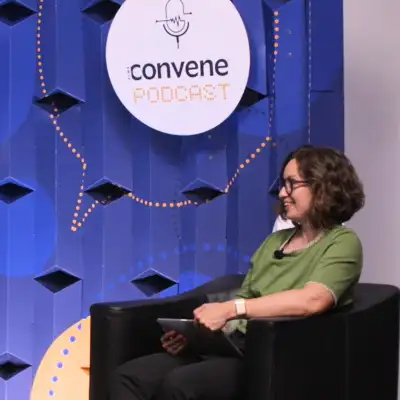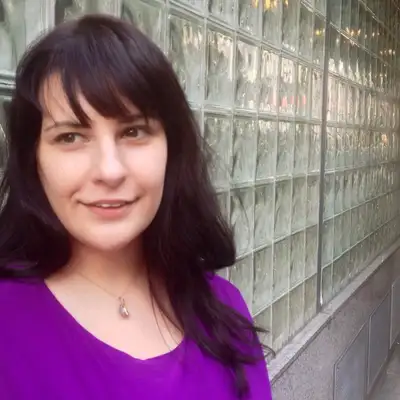Creators and Guests
What is PCMA Convene Podcast?
Since 1986, Convene has been delivering award-winning content that helps event professionals plan and execute innovative and successful events. Join the Convene editors as we dive into the latest topics of interest to — and some flying under the radar of — the business events community.
Convene Talk, ep. 70/July 18, 2025
*Note: the transcript is AI generated, excuse typos and inaccuracies
Magdalina Atanassova: This is the Convenient podcast.
I just want to note that this episode discusses extreme weather events and was recorded just days before the devastating floods in Texas and those in North Carolina.
The conversation is a reminder of the urgent need for preparedness and resilience in the face of climate change.
Welcome to another episode of the Convene Talk. Barbara, what have you picked for today's recording?
Barbara Palmer: Well, I wanted to talk about a report that has just been published in the International Journal of Disaster Risk Reduction and it's based on a study that we wrote about last year that was conducted by Shauna McKinley.
And Shauna is a principal. She's based in Vancouver.
She's a principal at Clear Current Consulting and she's a longtime expert in sustainability.
She consults with TED on their sustainability plans, their strategies,
but she also teaches a class about sustainable event management operations at the British Columbia Institute of Technology.
And that is where this study originated. And her students were just asking questions about climate change and how it was going to impact events.
And she said she really didn't have any data on that or just in an attempt to answer those questions. She just started building her own database about extreme weather events and what the impact was on events.
And I think it was 2023. She just began a systematic deep dive into what happened in Canada and it happened to be the worst wildfire year in history for Canada.
And I think what's notable about this paper is that she did it in conjunction with several co authors that that were from applied sciences and engineering.
So it's a multidisciplinary study at events. And I think it really marks one of the first, I think real data Rich looks at extreme events. Jen just wrote about the impact in Asheville,
North Carolina, about the flooding which were storms are the major disruptor of events. Wildfires I think have been in the headlines. But storms disrupt,
heat disrupts. And the data just keeps getting more and more compelling about the links to climate change and disruptions. And I'm going to stop talking.
I really want to hear,
there's so much in this,
but I really want to hear from you all. Jen, what are you thinking about?
Jennifer N. Dienst: Thanks, Barbara.
So I'm with you. I think some of the data,
I've not read this in its entirety as it came out yesterday and just had time to scan it. But I think some of the data points has already been kind of eye opening.
So one of the data points that also you just mentioned was that storms really dominated 82% of the disruptions were storm related. That includes floods, wind Hail.
However,
heat related incidents are also coming up the ranks.
So the number of those incidents have tripled.
The other data point that I thought was really interesting is that from a 20 year period, 2004 to 2024,
more than 2000 events were disrupted. And to be clear, these aren't business events.
These are a wide range of events from festivals to concerts.
I believe, you know, business events are included in there, like conferences. But this is, you know, when we say events, we're really talking about the vast spectrum of events here, just so everyone knows.
But over that 20 year time period, 2004 to 2024,
there were 2,000 events that were disrupted.
However, if we just look at 2023 to 2024,
there was an 86.5 increase in reported event disruptions due to weather events, which is pretty crazy. 86.5% increase.
So one of the things that she also covers in this report is the financial losses. So she said that single incident. Not she, the authors,
there was more than one single incidents caused up to $37 million in regional losses.
It also endangered fundraising targets, jobs and long term viability.
So there's economic reasons to care here too, I think. You know, obviously, like,
there's bigger reasons, people's safety and homes and all of that. But, you know, for people who are planning events, there's a very real financial risk when these events occur.
So, yeah, those are the. Some of the data points that stood out to me most. But yeah. Curious to know what your initial thoughts were from this study.
Barbara Palmer: You know, Jen, I was just gonna add to those losses.
Some of the losses that the report highlighted are the inability to get insurance,
like the costs of getting insurance. I mean, there's also like tremendous stress on event organizers when they're like thinking about attendee safety. They're balancing attendee safety, they're balancing the cost of canceling adds enormous stress.
And this was part of Shauna's original paper.
And there's also just the loss of all the things that we talk about that happen when people meet. Like there's, you know, the loss in the case of festivals and events that are not business related.
I mean, those are like community events that bring people together.
They're really culturally significant though. And one point I wanted to make about business events is even though these are like the Universe of events, 10% of the disruptions were to business events.
Yeah, I think that that's just significant.
Michelle,
what's on your mind?
Michelle Russell: I'm just thinking, you know, we talk about extreme weather events and just talking about heat.
So,
you know, I think during COVID a lot of events really focused on having pieces of their event held outdoors because it was definitely easier to control, you know, the whole concerns we had with transmitting germs.
Right during COVID And so, like, outdoor events became a big thing. And now I think that trend continues. And I, I wonder how extreme weather is having an impact on that, because I just interviewed someone from the American College of Lifestyle Medicine,
and the ability to be outdoors is one of their, like, pillars for their event, because lifestyle medicine is all about,
you know, wellness and proper diet and exercise and being outdoors.
So I, I think extreme weather, and they usually hold their event in Orlando in October, which could also have extreme weather at that point, or extreme heat would impact those events and the ability not to go outside and participate.
The other thing that I looked up, just knowing that we were going to talk about this, is there were two studies about how weather,
experiencing extreme weather and disasters is enough to change views on climate action.
And there were two studies and you would think, oh, if I personally have experienced either extreme heat or flooding or wildfires, I would say, oh, this is definite. I'm going to chalk this up to the fact that we're having global warming.
And I need to,
I need to support policies that are green.
But that's. It's sort of a mixed bag. So two different studies show that. One study shows that that may be the case. The other study said not so much.
One was published in Nature Climate Change, and it looked at the question of extreme weather and climate opinion using global data sets. Two different global data sets.
They surveyed public support for climate policy by asking people how much. They supported five specific actions to cut carbon emissions,
which included raising carbon taxes, improving public transport, using more renewable energy,
protecting forests and land, and taxing carbon heavy foods.
And the response is, on average, the support was fairly strong and especially high in parts of South Asia, Africa, the Americas and Oceania, but lower in countries including Russia,
Czechia and Ethiopia.
But in most cases, living in a country where more people are exposed to disasters was not reflected in stronger support for climate action. And wildfires were the only exception. And I think countries with more wildfire exposure showed slightly higher support.
And that's probably because they are so devastating.
Even flooding, there is a way, there's usually a way back.
But with wildfires, I think they can be so devastating to a community, as we saw in la.
So that was just my,
like, looking outside this immediate study to see what else.
Kate, what do you think?
Kate Mulcrone: So similar to your thinking,
I See that this report focuses a lot on outdoor events because it's so clear to see cause and effect.
But something that's missing is how extreme weather may prevent individual attendees or speakers or groups of people from coming to the event at the last minute.
And that we don't even really have a reliable way to measure that right now.
But that it's another critical issue that planners have to think about that isn't currently part of the discussion.
And how extreme weather disrupting transport has like a knock on effect throughout the event planning process.
Barbara Palmer: That's an excellent point,
Kate.
I think that is a great point. One of the things that just the discussion of attitudes made me think is that I would love to see that research done with event planners,
not just the general population.
And I think the opportunity here is for event planners to,
you know, be leaders.
I feel like when you go to an event,
it might not be immediately clear to you the sustainability measures that are operating in the background.
And a lot of times I know that I was going to a medical practice in New York City and it changed offices. And I suddenly loved going to this office in a way that I hadn't before.
And I found out that it was, well,
certified,
which is like an environmental certification. That's not just the carbon emissions, but it's like light is there, you know, do people have access to natural light? Are there plants? Is there water in the corner?
And I feel like people might not know the benefits and the costs because they're not directly exposed to them in the way that event planners would be.
So I'm excited that there's so much more research being done on this topic in conjunction with other disciplines. I think that the ILUS study mentioned extreme weather as well,
and it talked about how Europe, for example,
the EU,
is really tightening the measures that events have to follow.
So I think that there's some reason to hope that public opinion will follow sustainability leadership and also just economic pain. I mean, event planners might feel the economic pain before their attendees do,
but everybody, I think, is going to feel pain from climate change.
Maggie?
Magdalina Atanassova: Yeah, for sure. We are all feeling the pain one way or another.
Especially as we're recording,
a lot of us are experiencing some of those heat waves. So they are not fun and they bring a lot of side effects. So to say,
when you were speaking about measurement and also the effects on outdoor events, I was thinking that sometimes they even affect indoor events.
I've seen it when I was working for a PCO back in the day,
there was a disruption at an event in Kyoto, which was affected by a typhoon because that typhoon brought some destruction to the convention center. It knocked some windows. So the event was indoors, but it was still affected.
But it also, on the more hopeful side of, you know,
the industry coming together,
being a bit more proactive about measuring, understanding that we are lacking understanding in terms of financial losses, we are not understanding very well how to capture some data and how to present it to those interested parties.
But then we also have those collaborations that are, you know, shining a light on those things and giving the industry options.
And I couldn't think of another event than Convene for Climate.
So there will be a second iteration this year of Convene for Climate, which BCMA organized last year for the first time,
which aims at exactly doing that, gathering the industry together and being more practical. So sitting at the table and coming up with solutions that we can all apply.
Now we're past that timeframe of just speaking about what potentially we should do.
We need to act.
So that's the whole idea of Convene for Climate. And all the people that gather are people that are already hands on. They're not first timers, they're not new to this, they are engaged, involved and have all the understanding.
But the rest of the industry is always welcome to follow and support the initiative. So I'll definitely provide links in the show Notes for those interested to contribute and keep an eye out on what's being provided.
Thank you for the discussion and all the information we've mentioned will be linked in the show Notes as usual. Thank you.
Remember to subscribe to the Convene Podcast on your favorite listening platform to stay updated with our latest episodes. For further industry insights from the Convene team, head over to PCMA.org/convene. My name is Maggie. Stay inspired. Keep inspiring. And until next time.




